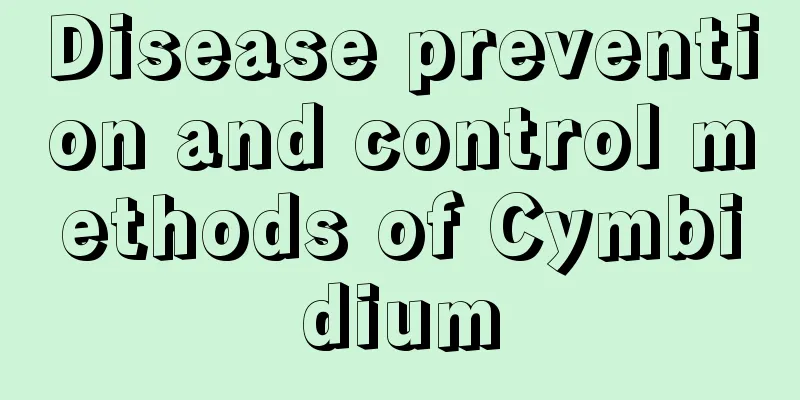Disease prevention and control methods of Cymbidium

Sclerotium rolfsiiSymptomsIt is usually released in hot and humid places. It often occurs on seedlings, infecting the roots and leaves. After the infection period, its unique white hyphae will appear at the junction of the base of the rhizome and the planting material. When the pathogen enters the base of the stem, the leaves are very easy to fall off. GovernanceSpray the cultivation medium with 1000 times of 1.50% toxin wettable powder, 3000 times of 2.50% fordonin wettable powder, or 1000 times of 3.75% mebutrin wettable powder. Stop spraying water for 5-7 days after spraying. The diseased leaves, diseased plants and nearby planting materials should be removed and burned, and nearby plants should be sprayed with control agents more than 3 times immediately. anthraxSymptomsIt can occur throughout the year, and the pattern of occurrence is that the plants become larger, ventilation is poor or management is improper, and it is more serious when the temperature is high and humidity is high. After the leaves are infected, small needle-shaped faded spots will appear and gradually expand. The color of the spots will gradually deepen and dark brown spots will appear in the later stage. Most spots will heal into irregular large spots, causing the leaves to wither and fall off. GovernanceSpray 2500 times of 25% poker la emulsion or 6000 times of 50% poker la manganese wettable powder. Cut off the diseased leaves and apply high-concentration medicine solution to the wounds. Apply potassium fertilizer moderately, apply fungicides reasonably, and apply pesticides in the early stages of the disease, but be careful to prevent pesticide damage. The cultivation environment needs to be improved to ensure good ventilation, lower humidity and reduce the spread of diseases. Soft RotSymptomsIt is easy to be infected in a humid and high-temperature environment, usually infecting the leaves, causing the whole body to turn brown and become soft and rotten, and even the whole plant may die. GovernancePay attention to ventilation and adjust the indoor humidity. When diseased leaves are found, they should be removed in time and burned in a concentrated manner. The tools used should also be cleaned to prevent bacterial invasion. For drug control, initially spray 800 times diluted 77% Kesaid microparticle wettable powder and 4000 times diluted 72% agricultural streptomycin sulfate soluble powder, spray once every 7 to 10 days, and spray 1 to 2 times. Physiological diseasesSymptomsDue to unsuitable environmental conditions, such as temperature, humidity, and many other factors. Symptoms of the disease include root rot, yellowing leaves, leaf burns, and blackening of leaves after frost damage. GovernanceFind the cause, prescribe the right medicine, make up for the deficiencies, provide all the conditions needed for the growth of orchids, and strive to create an environment suitable for its growth. Pay attention to adjusting the light temperature, humidity, pH, and ventilation according to different seasons and different times of the growth period. |
<<: Symptoms and prevention of hyacinth mosaic disease
>>: Prevention and control of major diseases and pests of Nepenthes
Recommend
Cultivation methods and precautions of Begonia truncatum
1. Breeding methods 1. Sunlight: It likes light. ...
How to prune Schefflera
Thinning and light pruning of young plants The yo...
How long does it take for orchids to acclimate after being repotted in autumn? Can they not be exposed to light during the acclimatization period?
1. How long does it take to adapt to the basin? G...
Pepper planting technology and management methods
Pepper, as a popular vegetable , is not only rich...
When is the right time to plant strawberries?
Best time to plant strawberries Strawberries can ...
How to grow shiitake mushrooms
1. Preparation before sowing Choose oily wood, su...
Does Nepenthes prefer shade or sun?
Does Nepenthes prefer shade or sun? Nepenthes is ...
Can mineral water be used to water flowers directly? Is watering flowers nutritious?
Water flowers directly with mineral water Mineral...
Can plum blossom cuttings survive in spring?
1. Can you survive? Plum blossoms can survive if ...
How to Identify Velvet Arrowroot
1. Blades The leaves of velvet arrowroot are abou...
How to plant roses to make them bloom more (make potted roses grow better and bloom more)
It is not difficult to grow roses at home. You on...
What causes cactus root rot?
1. Causes 1. When it needs to be fertilized, high...
Can the Christmas cactus plant survive if its leaves become shriveled and soft? What is the reason for the Christmas cactus plant's leaves to wilt?
The key to saving Christmas cactus plants from sh...
Can the lucky charm be watered with beer? What should be paid attention to when watering the lucky charm?
1. Can I pour beer on it? The lucky charm flower ...
How to water green cashmere succulent
Green Cashmere Succulent Watering Tips Green Cash...









